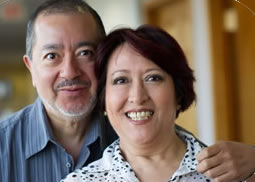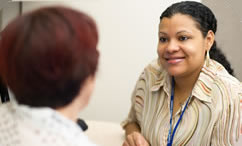Paying for Cancer

Contact the Patient Assistance Center at 877-907-0859, or Financial Services: 877-326-9155 or Guest Assistance Program: 800-888-9825
One couple finds U-M financial resources for cancer-related expenses during hard times
When Aracelli and Miguel Martinez left Mexico City for Michigan 30 years ago, health insurance was the last thing on their minds as the healthy couple and their two children began new lives in the Midwest. Fast forward to May 2009: their children grown, Aracelli worked as a caregiver to the elderly, Miguel managed the grounds and home of a family with a large property. The couple had lived in their Auburn Hills home for 10 years.
Michigan was in the midst of its second economic downturn when Aracelli fell ill, recalling a terrible headache and itching all over her body. An area hospital referred her to the U-M Emergency Department, which led her to the Rogel Cancer Center where she received a diagnosis of multiple myeloma, a cancer of the plasma cells in bone marrow that help our bodies fight infection.
Aracelli signed on to participate in a clinical trial and responded well to treatment, despite the possibility that her disease could be aggressive and she might have as little as six months.
"I was very scared at first, but then focused on getting well. I thought my life was worth it," Aracelli says. "I thought I'd go back to work in a month or two, but a year passed and I still couldn't go back. Then I needed a transplant and other problems came along."
During that period, Aracelli lost her job. Then, Miguel lost his job, too, and the van that came with his employment. Over the next year, with Aracelli still in treatment, the couple lost their home.
"We were devastated," Aracelli says. "We were almost on the street. I wasn't able to spend one dollar on my medication.
FINANCIAL SUPPORT
So, how did a couple without health insurance or employment in the midst of a recession manage to pay for treatment?
According to Miguel, his wife's treatment experience came with "the whole package," including practical and financial resources for qualified patients.
Patient Financial Counselor Sue Thornton sees many patients newly diagnosed with cancer who are stressed about bills they cannot pay. In Aracelli's case, a U-M social worker came to her when she began the clinical trial, was hospitalized and did not have health insurance.
"If it wasn't for them, I wouldn't have had treatment," Aracelli says. "I was embarrassed in the beginning, to tell the truth. But they treated me like a good friend with such good care you don't even realize how much they're doing for you. They came to my rescue."
"Often people come to me before they've even had a chance to accept a heavy-duty diagnosis," Thornton says. "We screen patients for state assistance and, once we get through that criteria, for other programs like MSupport or Medicaid." Thornton can then help patients navigate the processes and procedures required for whatever assistance is available, from individualized payment plans to discounted payments.

Visit the Patient Assistance Center's webpage.
PRACTICAL SUPPORT
Medical bills aren't the only costs that come with cancer. According to social worker Katie Schneider, L.L.B.S.W., from the Guest Assistance Program, medication costs and transportation are key areas of stress for many cancer patients. For these practical matters, the Rogel Cancer Center's Patient Assistance Center (PAC) offers a range of services, like helping patients get wigs or figuring out which national and local programs offer aid for various expenses.
The Martinez family was fortunate to be able to borrow a car from family members in order to make the drive from Auburn Hills to Ann Arbor. For those without transportation, the PAC works with individual patients to find ways to obtain transportation and cover the expense, whether through insurance, community agency programs or other methods.
Social Service Technician Sarita Castro works with Schneider to find solutions for patients' needs -- making phone calls, communicating with physicians and nurses, and keeping patients informed on progress.
"I'm always learning about new cancer resources and they're changing all the time," Castro says. "I connect patients with the resources out there. A number of patients need help with medication co-pays. There are a lot of foundations that help with different cancer diagnoses. I help facilitate applying to co-pay relief foundations."
Schneider says many patients aren't prepared to learn their medications could cost thousands of dollars per month. For Aracelli, whose condition is stable, taking a chemotherapy pill is part of her daily regimen. She utilizes PAC resources to help with those costs.
"They help me coordinate my medication," Aracelli says. "Right now, Sarita and Katie are trying to get me one of the most expensive drugs. They are talking directly to the pharmaceutical company to see what they can do."
KEEP TROUBLESHOOTING
Thornton stresses there are many different ways to problem-solve and think outside the box in order to help patients with expenses. Her role, as well as Schneider's and Castro's at the PAC, is to understand the resources out there for cancer, understand each patient's needs and facilitate those connections to help ease the financial burden so the patient can concentrate on healing.
Resources
U-M Rogel Cancer Center Resources
Financial Resources
Nation-wide Resources
The National Comprehensive Cancer Network's Virtual Reimbursement Resource Root
See these job search tools for managing a job search during or after cancer treatment.
What to say when a coworker has cancer.
If you are a patient of the U-M Rogel Cancer Center:
Contact the Patient Assistance Center at 877-907-0859, or visit the center on Level 1 of the Rogel Cancer Center.
Financial Services: 877-326-9155
Guest Assistance Program: 800-888-9825
